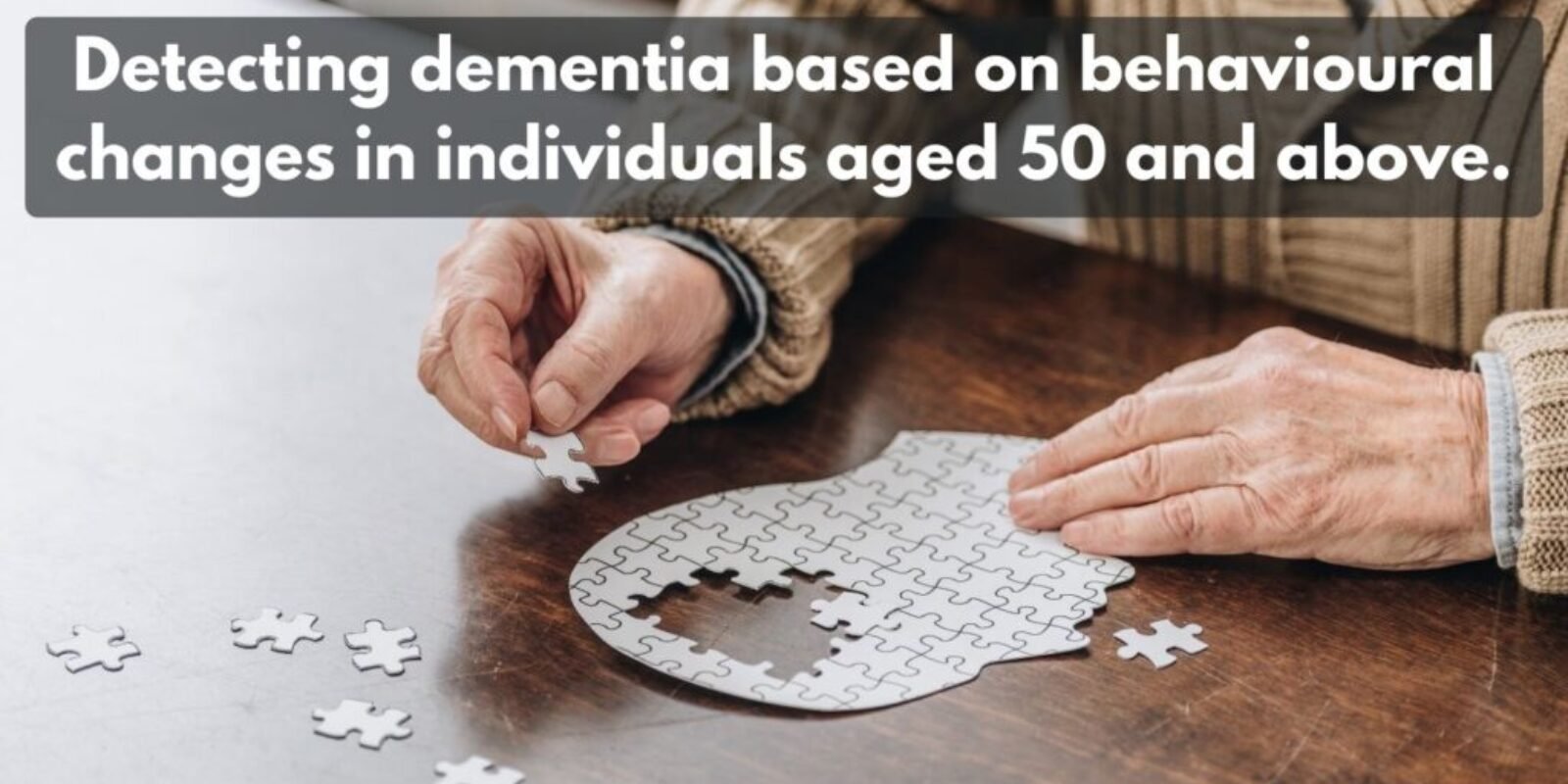We often correlate dementia merely to forgetfulness, like an older individual persistently misplacing their glasses or repeatedly probing similar questions. But Identifying Dementia is more of an enigma than you might believe, with a range of symptoms that far transcend momentary memory lapses.
Identifying dementia through behaviour changes, especially after the age of 50, is a crucial task for healthcare professionals and loved ones. Understanding and observing behaviour shifts are essential in detecting the onset of dementia.
Our goal is to analyze and clarify these significant alterations in behaviour, providing a powerful tool against dementia.
Subtle Behavioral Nuances in Identifying Dementia
Early detection of dementia relies on recognizing subtle behavioural nuances that precede a formal diagnosis. Among regular aging processes, certain behavioural shifts stand out, indicating a deeper, more concerning undercurrent of cognitive decline.
This includes identifying changes like social withdrawal, abnormal mood fluctuations, and persistent memory lapses, which may otherwise be dismissed as normal signs of aging.
Furthermore, it is crucial to consider the psychological consequences that come with these changes. The person going through these alterations may oscillate between awareness and denial, fear and frustration, thus making the diagnostic situation more complex.
Prefer to listen rather than read?
The Symbiotic Relationship Between Behavioral Changes and Cognitive Decline
Identifying dementia can feel like decoding a puzzle. Understanding the relationship between behavioural shifts and cognitive decline is key to understanding dementia.
Let’s simplify this. Imagine your brain as a complex highway system, with thoughts, memories, and actions zooming along unique paths.
Now, let’s think of dementia as a series of roadblocks popping up on these once smooth-running roads. Naturally, the traffic – our memories and behaviours – faces disruptions.
As certain pathways are blocked (a metaphor for cognitive decline), the usual routes (our typical behaviours) cannot be taken, redirecting to alternate, often less efficient, roads that illustrate those stark, often perplexing behavioural shifts.
The fascinating, yet perplexing thing here is that these shifts aren’t simply a result of the roadblocks but sometimes, they add more obstructions themselves. It becomes a two-way street.
Cognitive decline can change behaviour, but altered behaviours, especially if they lead to less mental stimulation or social interaction, can further enhance cognitive decline.
In our journey of identifying dementia, exploring this relationship is paramount. It isn’t just about recognizing memory lapses but deciphering how behavioural alterations reciprocally interact with cognitive decline, shaping a complex, intertwined narrative.
Understanding this doesn’t merely brighten the path of those experiencing dementia but also lights the way for caregivers, guiding them in offering responsive, empathetic, and effective care, ensuring a journey through dementia that’s navigated with utmost understanding and support.

A crucial part of this lies in not merely observing, but understanding these behavioural shifts as a compass, pointing towards the underlying cognitive alterations in older people. It’s not merely about ‘seeing’ the changes but ‘understanding’ them, approaching them with a spirit of empathy and informed responsiveness, ensuring that our approach to care is as informed as it is compassionate.
In identifying dementia, it is important to be observant not only of obvious signs but also of subtle behavioural changes that may suggest underlying cognitive difficulties. This approach will help us provide dementia care with empathy and informed support, ensuring that our experience as caregivers and individuals facing dementia is accompanied by understanding and dignity.
The Unseen Facets of Dementia: A Deeper Look
Identifying dementia often takes us on a path where we uncover layers that are far more complex and intricate than just memory lapses. When we delve into the realm of dementia, especially post the age of 50, we’re not just observers, but interpreters of subtle signs that go beyond forgetfulness.
The science behind dementia talks of neural connections, synaptic activities, and cerebral atrophy. But the human experiences sewn into the tapestry of dementia are threaded with changes that are far more than neurological – they are deeply personal and invariably impactful.
Lack of Passion – Apathy
Navigating through the silent echoes of apathy, especially in the later stages of life, can potentially offer clues in identifying dementia. When the eyes lose their former sparkle and enthusiasm dwindles into an indistinct haze, it’s not merely a passing disinterest but might be signalling something deeper, more profound. Imagine a lively, ever-passionate individual gradually submerging into an ocean where emotions and motivations can no longer pierce through.
The journey into identifying dementia isn’t always through forgotten keys or misplaced words but might softly tread through the less noticeable paths of emotional numbness and a subtle, yet persistent, withdrawal from the passions that once defined them.
It’s like witnessing a vivid, colourful painting slowly fading into an ambiguous grey. It’s crucial, then, to pierce through the surface of apparent ‘disinterest’ and recognize it might be a silent cry from a brain struggling to connect with its emotional self.

In our endeavours, understanding and identifying dementia through such emotional and behavioural shifts becomes not just a medical necessity but a humane obligation. It is our collective responsibility to extend our hand, to gently navigate through their subtly altering world, ensuring they are not navigating through this silent transformation alone.
In this, we emphasize the importance of observing beyond the surface and recognizing the subtle signals of a mind grappling with dementia. Our sensitivity to these nuances, and our response to them, not only strengthens our professional insight but also highlights our inherent humanity when addressing the complex aspects of dementia.
Emotional Instability
Emotional changes can be a telling sign when it comes to identifying dementia. Imagine a close friend who, out of the blue, gets unusually sad or stressed over everyday stuff like upcoming events or regular visits.
They might have what’s called “affective dysregulation.” It’s a fancy term that simply means their emotions are a bit out of whack. Instead of their usual steady mood, they’re now experiencing quick mood shifts, becoming anxious or downhearted over things they once took in stride.
It’s like their emotional roller-coaster has suddenly become a lot bumpier. And while we all have off days, consistent emotional instability can be a red flag. If you notice this in someone, it’s essential not to brush it off. Identifying dementia early on, through such signs, can make a significant difference.
Being aware and taking steps can be crucial, not just for them but for everyone who cares about them. Remember, when it comes to identifying dementia, understanding and empathy go a long way.
Impulse Dyscontrol
Identifying dementia, particularly through subtle, yet impactful behavioral shifts like impulse dyscontrol, unfolds a challenge that intertwines emotional and logical aspects.
When we delve into the concept of impulse dyscontrol, we’re essentially exploring a situation where an individual finds themselves struggling to manage their immediate desires and behaviours. It’s like an internal battle where the ability to say “stop” or “wait” to oneself gets disrupted or weakened.
Imagine a scenario where every impulse or urge that flashes through your mind dictates your actions without the protective filter of forethought, caution, or societal norms. It’s not merely a ‘want’ that gently nudges you, it becomes an unbridled ‘need’ that forcefully propels actions, irrespective of appropriateness or consequence.
People grappling with impulse dyscontrol may teeter on the edge of agitation and might exhibit a formidable resistance to patience. Their emotions might be compared to a precarious seesaw, vacillating between irritable discontent and dogged insistence.
This could manifest as increased stubbornness, an uncompromising stance, or perhaps a reduced tolerance towards frustration. The roadblocks to recognizing alternate perspectives or relinquishing their viewpoint, even momentarily, become seemingly insurmountable.
Occasionally, the impulsivity cascades into socially and personally disruptive behaviours. From unbridled shopping sprees to unexpected and inappropriate sexual advances, the spectrum of actions driven by diminished impulse control is vast and varied.
Here, the crucial link to identifying dementia lies delicately interwoven. Dementia isn’t just memory glitches or momentary lapses of recognition. It often softly nudges an individual into a realm where their actions, behaviours, and social propriety begin to unspool, sometimes almost imperceptibly.
Understanding impulse dyscontrol is not merely about recognizing unbridled impulsivity but discerning the subtle, often silent, echoes of cognitive decline that reverberate beneath the surface.
Our collective mission is not just about identifying dementia but extending a hand of unwavering support, guidance, and empathetic companionship to those silently struggling amidst the turbulent waves of cognitive and behavioural shifts.
Inappropriate Social Behavior
Social behaviour is like an unspoken language, a dance of unwritten rules and cues that we learn and adapt to as we grow. As we mature, we tend to understand the subtleties of social interactions, ensuring that we fit into societal frameworks.

However, when someone begins to show signs of inappropriate social behaviour, it can be alarming, especially if it’s a stark shift from their usual conduct. It may, in fact, be a clue in identifying dementia.
Imagine a close friend or family member who, for years, has been the epitome of politeness and decorum. Suddenly, they start sharing intimate details with strangers, make offhand remarks that seem out of character, or perhaps display a lack of empathy where they once were compassionate. These aren’t just quirks or bad days; these could be signs of cognitive shifts.
The very essence of identifying dementia often lies in observing these changes in behaviour. A person may begin to lose the filters or social judgment they once had. Topics that were once deemed private might now be discussed in the open, without any forethought to the consequences.
A friendly interaction with a stranger might be overly familiar, or they might inadvertently come off as rude or uncaring in situations that previously would have evoked empathy.
It’s essential to approach these behavioural changes with understanding and patience. While it can be jarring to witness, remember that the individual might not be fully aware of their actions.
When identifying dementia, it is important to consider the expertise and trustworthiness of medical professionals in guiding diagnosis and care. If you notice these behaviours in someone you know, it may be worth discussing with a healthcare expert to gain insight into potential underlying causes.
Anomalous Mental Impressions or Ideas
While everyone has their unique quirks and thought processes, certain patterns might hint at deeper cognitive issues. It’s essential to understand and recognize these signs, especially when it comes to identifying dementia.
If someone you know starts expressing strange ideas or seems to have unusual perceptions, it’s worth paying attention. They might become overly suspicious, fearing that people around them have malicious intentions.
These concerns can range from thinking someone is out to harm them to believing others want to swipe their belongings. Even more telling, they might mention hearing voices or claim to see things that aren’t present.

Of course, jumping to conclusions isn’t the way to go. Before pinning these behaviours on dementia, one should consider other factors. Maybe they’re reacting to a medication, facing extreme stress, or even dealing with another medical condition.
But if you’ve ruled out these possibilities and the behaviours continue, it underscores the importance of identifying dementia early on. Seeking expert advice from a doctor can provide clarity, ensuring they get the care and attention they deserve.
Always remember, identifying dementia isn’t about labelling someone; it’s about understanding them better and ensuring they lead healthier, happier lives.
Deploying Innovative Strategies for Managing Behavioral Changes
Navigating through the complexity of identifying dementia, especially through the lens of behavioural changes, opens up a compassionate pathway that is both enlightening and challenging. It’s akin to embarking on a heartfelt journey, where we seamlessly blend scientific understanding with a humane touch, ensuring every step we take resonates with empathy and depth.
As we explore non-pharmaceutical approaches, our focus sharpens on creating an environment that’s not merely a reactive space to the challenges brought about by dementia but is a proactive haven that actively enhances life’s quality for everyone involved.
Engaging in identifying dementia in its early stages enables us to weave a blanket of support, where innovative strategies become our guiding stars, illuminating our path with gentle yet firm assurance. This isn’t simply about deploying scientific interventions.
Our aim is to create a welcoming and supportive environment for every individual and their caregivers. We use our extensive knowledge and practical experience to address behavioural and psychological symptoms while working towards a future where every action is dedicated to improving the quality of life in a meaningful and lasting way.
Crafting a daily rhythm, embedding helpful memory aids, nurturing a secure and cozy home, and cultivating lively social engagement become our cornerstones in proficiently steering through the behavioural alterations often spotted when identifying dementia. Adapting these approaches to respect and honour the individual peculiarities, likes, and hurdles of each person not only boosts the potency and longevity of these tactics but also knits a protective layer that softly catches the stumbles encountered amid cognitive descent.
Here’s the magic – personalization! It’s not just about recognizing a decline; it’s about holding hands with our loved ones and walking through their unique journey in a way that’s sprinkled with familiarity, warmth, and understanding.
The tiny, thoughtful changes we infuse into their daily life, from a well-placed reminder note to a cozy, familiar living area, serve as tiny lifeboats, subtly supporting them amid the often-turbulent sea of memory challenges.
And this isn’t just about the physical aspects. It’s crucially about emotions, navigating through them, and recognizing that identifying dementia isn’t a solitary moment, but a path that we tread gently and empathetically them.
And here’s where our collective knowledge, shaped by robust expertise and deeply rooted experience, becomes their beacon. By not merely identifying dementia, but intricately understanding its subtle nuances and respecting the uniqueness of each journey, we provide a robust, gently supporting arm, reassuringly guiding them through every step of their cognitive journey.
This isn’t just care. It’s an empathetic, knowledgeable embrace that envelops them in safety, understanding, and ceaseless, gentle support. This commitment to providing individualized, compassionate, and informed guidance is what seamlessly melds expertise, experience, authoritativeness, and trustworthiness into a sanctuary of dependable care and understanding.
An Ongoing Quest in Understanding and Managing Dementia
Navigating the path of identifying dementia, especially spotlighting behaviour changes post-50, becomes a journey that unites us all in a special way. Sometimes, understanding and managing dementia isn’t merely about the scientific and medical aspects, but about the human journey that intertwines with it.
It’s not only about the end destination – the diagnosis – but about the adventures and challenges that come afterwards. How do we provide a supportive and loving space for those on this journey and ensure their days are filled with quality and dignity?
We learn we adapt, and we innovate, not just to keep stride with the evolving nature of dementia but to preemptively offer a light in the seemingly dark tunnels of cognitive decline. We become the pillar that supports not only the person experiencing dementia but also their loved ones and caregivers.
In a world where every step forward in dementia care is a victory, identifying dementia early becomes our shared mission, and guiding those affected by it with empathy and expertise becomes our shared responsibility.
Disclaimer
The content provided on MySeniors.World is for informational purposes only and is not intended as either financial or medical advice. Always consult a qualified professional before making any investment or health-related decisions.
Posts may contain affiliate links, meaning we earn a commission – at no additional cost to you, if you click through and make a purchase. Your support helps us continue providing valuable content.



















